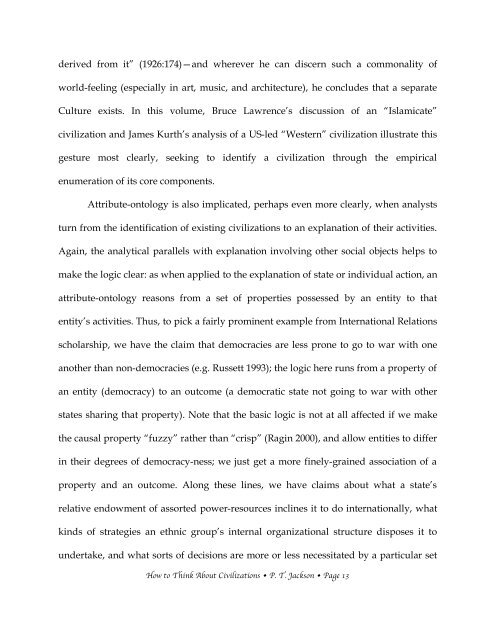How to Think About Civilizations - The Watson Institute for ...
How to Think About Civilizations - The Watson Institute for ...
How to Think About Civilizations - The Watson Institute for ...
You also want an ePaper? Increase the reach of your titles
YUMPU automatically turns print PDFs into web optimized ePapers that Google loves.
derived from it” (1926:174)—and wherever he can discern such a commonality of<br />
world-feeling (especially in art, music, and architecture), he concludes that a separate<br />
Culture exists. In this volume, Bruce Lawrence’s discussion of an “Islamicate”<br />
civilization and James Kurth’s analysis of a US-led “Western” civilization illustrate this<br />
gesture most clearly, seeking <strong>to</strong> identify a civilization through the empirical<br />
enumeration of its core components.<br />
Attribute-on<strong>to</strong>logy is also implicated, perhaps even more clearly, when analysts<br />
turn from the identification of existing civilizations <strong>to</strong> an explanation of their activities.<br />
Again, the analytical parallels with explanation involving other social objects helps <strong>to</strong><br />
make the logic clear: as when applied <strong>to</strong> the explanation of state or individual action, an<br />
attribute-on<strong>to</strong>logy reasons from a set of properties possessed by an entity <strong>to</strong> that<br />
entity’s activities. Thus, <strong>to</strong> pick a fairly prominent example from International Relations<br />
scholarship, we have the claim that democracies are less prone <strong>to</strong> go <strong>to</strong> war with one<br />
another than non-democracies (e.g. Russett 1993); the logic here runs from a property of<br />
an entity (democracy) <strong>to</strong> an outcome (a democratic state not going <strong>to</strong> war with other<br />
states sharing that property). Note that the basic logic is not at all affected if we make<br />
the causal property “fuzzy” rather than “crisp” (Ragin 2000), and allow entities <strong>to</strong> differ<br />
in their degrees of democracy-ness; we just get a more finely-grained association of a<br />
property and an outcome. Along these lines, we have claims about what a state’s<br />
relative endowment of assorted power-resources inclines it <strong>to</strong> do internationally, what<br />
kinds of strategies an ethnic group’s internal organizational structure disposes it <strong>to</strong><br />
undertake, and what sorts of decisions are more or less necessitated by a particular set<br />
<strong>How</strong> <strong>to</strong> <strong>Think</strong> <strong>About</strong> <strong>Civilizations</strong> • P. T. Jackson • Page 13
















